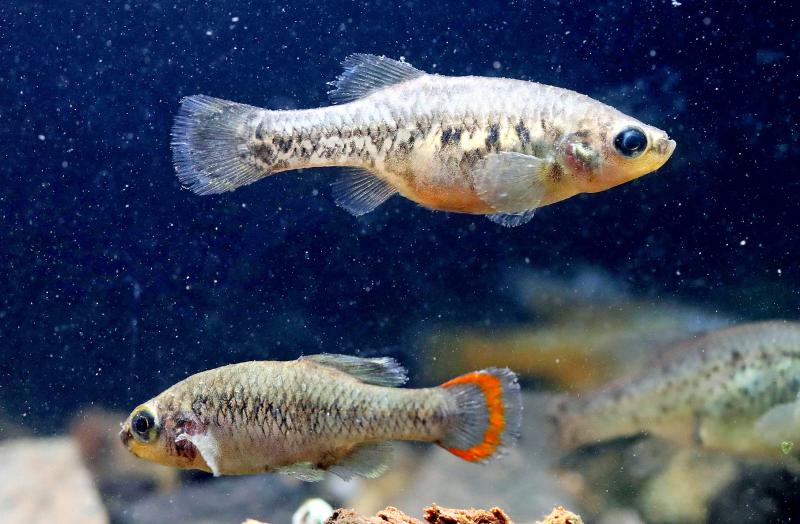Residents of a small town in western Mexico are celebrating the reintroduction into the wild of the tequila fish — an endemic species saved from the brink of extinction.
The fish, whose scientific name is Zoogoneticus Tequila, was rescued in the 1990s by US and British conservationists who kept it in aquariums and helped it return to its original habitat in the Teuchitlan river.
Children in Teuchitlan, home to about 10,000 people, have been at the forefront of efforts to inform visitors not only about the importance of keeping their habitat clean, but also about the tequila fish.

Photo: AFP
“The children are the ones who approach people on the river bank and tell them that in this river lives a little fish that is unique in the world ... and that they participated in its reintroduction,” said Consuelo Rivera, a 70-year-old retired teacher.
The tequila fish was reported to be extinct in 1998, possibly due to fragmentation of its habitat, pollution and competition from non-native species, the International Union for the Conservation of Nature (IUCN) said.
The species survived only in captivity for several years until conservationists, led by Michoacan University, began the process in 2014 to reintroduce it into the wild.
Since then the fish has gone from strength to strength, helped by the last major release of fish in 2018, project leader Omar Dominguez said.
The tequila fish grows to about 7cm and the male has a bright reddish-orange tail.
It shares the name of the world-renowned Mexican liquor originating in the town of Tequila, which, like Teuchitlan, is in the state of Jalisco.
The species has unique characteristics, such as giving birth to well-developed fetuses, which it feeds through a kind of umbilical cord similar to that of humans, Dominguez said.
“It’s an important part of the ecosystem. It’s a carnivorous species and it feeds, for example, on mosquito larvae, which keeps ecosystems healthy for humans,” he added.
There are now estimated to be 1,500 to 2,000 tequila fish in the wild and the species is listed as endangered by the IUCN.
The civil society group Guardians of the River carries out educational campaigns and workshops for children and adults to show them the flora and fauna of the area.
Tourism also plays an important role in the initiative.
Local visitors bathe in spa pools around the river said to have therapeutic properties, and swim with the fish — also known as gallito (little rooster) because of its colorful tail.
“There are a lot of little fish. They swim together with people and sometimes the little fish also start to bite people, to caress them,” said Maria Aurea Martinez, a spa employee.
Jaime Navel, a local parish priest, sees the species as “the little fish that was resurrected, that came back to life.”
“There’s awe and joy in the community,” he said.

A fire caused by a burst gas pipe yesterday spread to several homes and sent a fireball soaring into the sky outside Malaysia’s largest city, injuring more than 100 people. The towering inferno near a gas station in Putra Heights outside Kuala Lumpur was visible for kilometers and lasted for several hours. It happened during a public holiday as Muslims, who are the majority in Malaysia, celebrate the second day of Eid al-Fitr. National oil company Petronas said the fire started at one of its gas pipelines at 8:10am and the affected pipeline was later isolated. Disaster management officials said shutting the

US Vice President J.D. Vance on Friday accused Denmark of not having done enough to protect Greenland, when he visited the strategically placed and resource-rich Danish territory coveted by US President Donald Trump. Vance made his comment during a trip to the Pituffik Space Base in northwestern Greenland, a visit viewed by Copenhagen and Nuuk as a provocation. “Our message to Denmark is very simple: You have not done a good job by the people of Greenland,” Vance told a news conference. “You have under-invested in the people of Greenland, and you have under-invested in the security architecture of this

UNREST: The authorities in Turkey arrested 13 Turkish journalists in five days, deported a BBC correspondent and on Thursday arrested a reporter from Sweden Waving flags and chanting slogans, many hundreds of thousands of anti-government demonstrators on Saturday rallied in Istanbul, Turkey, in defence of democracy after the arrest of Istanbul Mayor Ekrem Imamoglu which sparked Turkey’s worst street unrest in more than a decade. Under a cloudless blue sky, vast crowds gathered in Maltepe on the Asian side of Turkey’s biggest city on the eve of the Eid al-Fitr celebration which started yesterday, marking the end of Ramadan. Ozgur Ozel, chairman of the main opposition Republican People’s Party (CHP), which organized the rally, said there were 2.2 million people in the crowd, but

JOINT EFFORTS: The three countries have been strengthening an alliance and pressing efforts to bolster deterrence against Beijing’s assertiveness in the South China Sea The US, Japan and the Philippines on Friday staged joint naval drills to boost crisis readiness off a disputed South China Sea shoal as a Chinese military ship kept watch from a distance. The Chinese frigate attempted to get closer to the waters, where the warships and aircraft from the three allied countries were undertaking maneuvers off the Scarborough Shoal — also known as Huangyan Island (黃岩島) and claimed by Taiwan and China — in an unsettling moment but it was warned by a Philippine frigate by radio and kept away. “There was a time when they attempted to maneuver